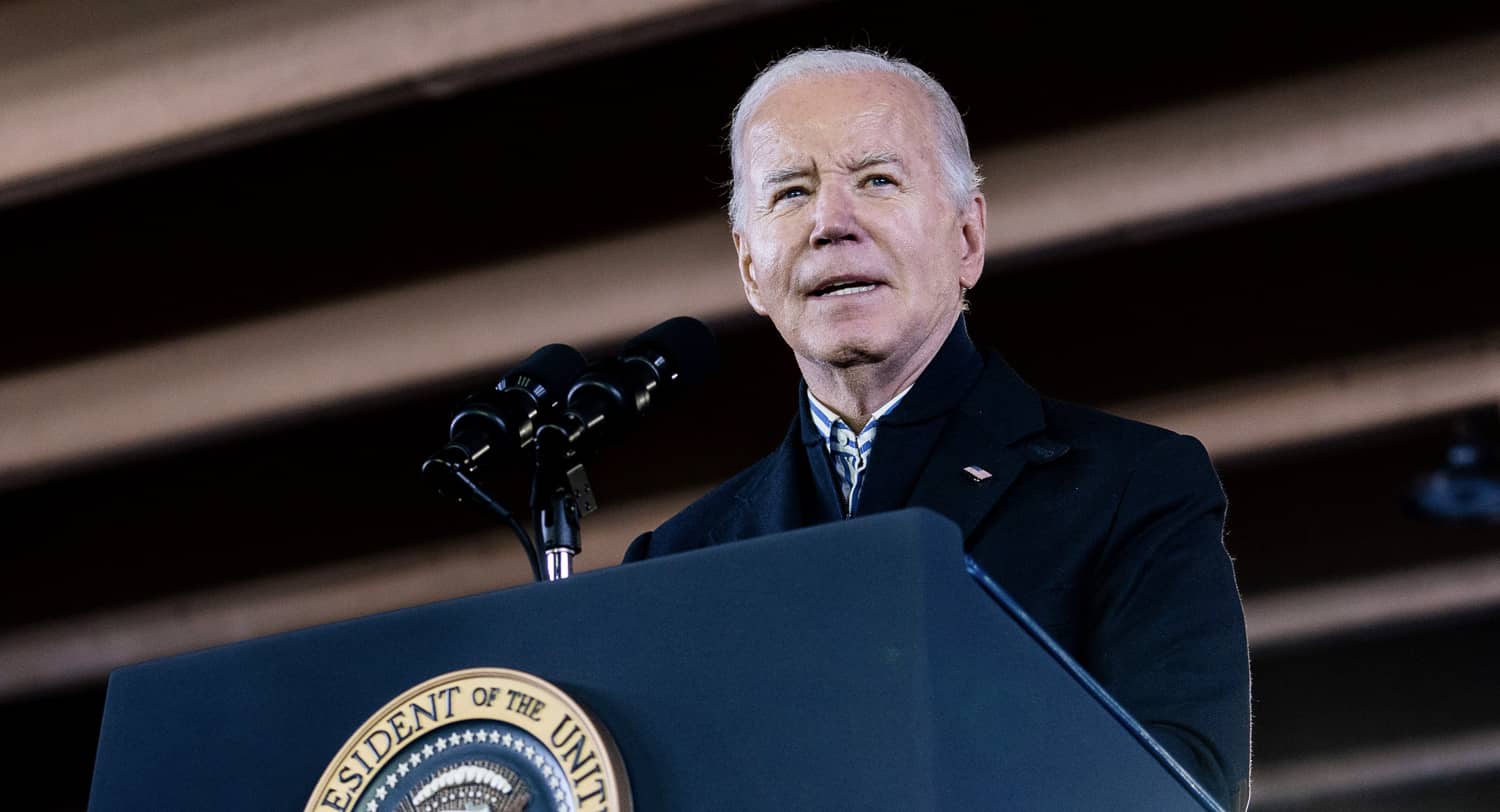President Joe Biden’s poll numbers are in freefall. A December 14 Pew poll found that only one-third of respondents approve of his job performance, the lowest such result since he took office. Moreover, his approval ratings even among Democrats plunged twelve percentage points since October 2022.
>> Window on Washington: Read more from Dov S. Zakheim
Arguably, one possible reason for Biden’s drop in the polls is his Biden’s handling of the Gaza crisis. In the Wall Street Journal’s most recent poll of registered voters, only 37 percent of respondents approved Biden’s handling of the Israel-Hamas war and 52 percent voiced their disapproval; 55 percent supported Israel’s conduct of the war.
Biden has lost ground with young progressives who have been demanding a ceasefire virtually since the day after the Hamas attack on October 7, when Israel’s counter-attack began. Notably, fifty percent of voters aged eighteen to twenty-nine disapprove of his support for Israel. These voters are a critical constituency especially in swing states that Biden must dominate if he is to overcome Donald Trump’s seemingly growing lead in polls that measure a head-to-head race between the two men.
It is not only younger voters who oppose Biden’s handling of the Gaza crisis. Older voters appear even more upset with Biden’s pro-Israel policies. According to the latest CBS poll, more than two-thirds of voters ranging between the ages of thirty to forty-four, sixty-three percent of respondents aged forty-five to sixty-four, and sixty percent of respondents older than 65 ascribe to the same view. Since Republicans, especially conservative Republicans, continue to trend higher in their unstinting support of the Jewish state, the CBS numbers clearly are weighted toward Democrats of all ages whose votes Biden needs if he is to be re-elected.
Biden is also facing growing unease on Capitol Hill with his persistent support of the Jewish state and his refusal to push Israel to accept a cease-fire or even to be more forceful in advocating that Jerusalem cut back on the tempo of its military operations in the Gaza Strip.
So far, however, this concern has not manifested itself in any cutting of military aid to Israel; indeed, the vast majority of lawmakers in both houses of Congress support such assistance. The most recent example of their commitment was the overwhelming passage of the Fiscal Year 2024 National Defense Authorization Act that included numerous new provisions of military cooperation with Israel. These included: $47.5 million for a new American-Israeli cooperative effort to address emerging technologies such as artificial intelligence and quantum computing, and an increase in funding for a joint program to counter unmanned aerial systems.
In addition, the National Defense Authorization Act directs the US Defense Department to develop a strategy to improve both maritime domain awareness and interdiction capabilities to counter seaborne threats against Israel. These have increased with Houthi attacks on all shipping in the Red Sea it deems related in some way to the Jewish state. Authorization legislation does not yet provide for actual expenditure. Nevertheless, should the Congress finally approve a defense appropriations act, which due to the political impasse in the House of Representatives may not happen for some time, the funding provision in the authorization bill is unlikely to be reduced in any major way.
On the other hand, a number of legislators, particularly in the House of Representatives, have grown increasingly reticent about supporting Israel’s Gaza operation. One early indicator of a change in the atmosphere on Capitol Hill was the October 10 vote. In addition to the six-member “Squad” who consistently oppose aid to Israel, three other members of the House–including one Republican—voted against sending Iron Dome anti-missile systems that Israel sorely needed in the immediate aftermath of the Hamas attack.
A stronger indication of the changing mood on Capitol Hill was a letter signed by 14 Democratic senators on November 2 that called for a “short-term cessation of hostilities” in Gaza and added that “the failure to adequately protect non-combatant civilians risks dramatic escalation of the conflict in the region and imposes severe damage on prospects for peaceful coexistence between Israelis and Palestinians.” Most signatories, such as Ed Markey (Massachusetts) and Chris Murphy (Connecticut), are identified as progressives who are often critical of Israeli policies vis-a-vis the Palestinians. On the other hand, several others, like the letter’s co-sponsor Mark Warner (Virginia) and Jeanne Shaheen (New Hampshire), represent the moderate wing of the Democratic caucus. Their inclusion in this letter indicates that moderates may also be developing second thoughts about Biden’s unstinting support of Israel’s Gaza offensive.

During the course of the following six weeks, as the war has dragged on and the number of Palestinian civilian deaths has mounted, Biden and his leading officials, notably Secretary of State Tony Blinken, National Security Advisor Jake Sullivan and Secretary of Defense Lloyd Austin, began to urge Prime Minister Benjamin Netanyahu to take several steps. These include reducing the Israeli bombing attacks, replacing large-scale operation with surgical strikes, planning for an early end to the Gaza operation in late January, and assigning the highest priority to freeing the 129 hostages that remain in captivity, among them persons holding dual American-Israeli citizenship
At the same time, Biden has urged Netanyahu to support a two-state solution, accept Palestinian control over Gaza once the guns are silent, take control over settler vigilantism on the West Bank, and reorganize his government, a heavy hint that he should dismiss the likes of Itamar Ben Gvir and Bezalel Smotrich.
Netanyahu has essentially ignored all of Biden’s requests. He has explicitly rejected the notion of a two-state solution, saying that he will not tolerate a “Fatahstan” any more than a “Hamastan.” He has made it clear that he likewise has no intention of bringing the war to an end for at least several more months, and that while he is deeply concerned about the fate of the hostages, he will not let their situation influence the pace and intensity of the IDF’s military operations. Finally, he has given no indication whatsoever that he plans to dismiss any of the extreme right-wing ministers who serve in his government.
Despite Netanyahu’s defiant stance, Biden continues to give Israel his unflinching support. He has done so In the face of overwhelming United Nations General Assembly votes, an urgent ceasefire resolution that Secretary General Antonio Guterres brought before the Security Council which America vetoed, and growing unease on the part of European allies. The most he has done to underscore his concerns has been to block visas for West Bank settlers engaged in violence against Palestinians.
On the other hand, with Congress at loggerheads over the content of the Administration’s proposed $100 billion supplemental funding for Israel (plus outlays for Ukraine and Taiwan), on December 8 Biden sidestepped congressional review and invoked his emergency authority to provide Israel with 14,000 urgently needed tank shells worth $106.5 million. Senior Administration officials indicate that he will do so again as long as Congress fails to pass the supplemental.
In light of his miserable poll results, increasing Congressional frustration with Israel’s conduct of the war, and Netanyahu’s almost open defiance of Biden’s requests for policy changes, it is a wonder that the President continues to back Israel through thick and thin. One possible theory is that, despite his denials, Biden has decided not to run again for office and as a self-professed “non-Jewish Zionist” no longer feels constrained by domestic political considerations. But whatever his motives, one thing is totally clear: since 1948, the State of Israel has never had a better friend residing at 1600 Pennsylvania Avenue.



